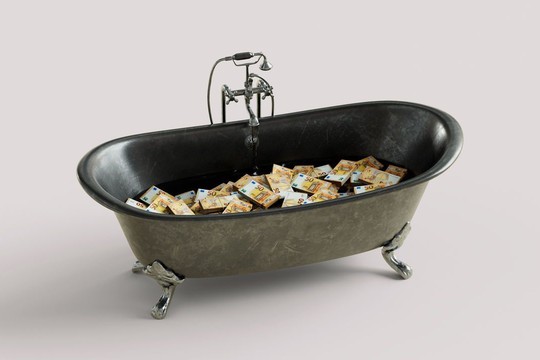The EU’s clean-up isn’t working fast enough.
Pic.: The Economist
“It was retro style,” laughs Ruta Kaziliunaite, the co-ordinator of Lithuania’s Special Investigation Service (STT), the country’s anti-corruption police. Last November the former leader of the Liberal Movement party was convicted of taking bribes from an executive at mg Baltic, a trading and real-estate conglomerate. It was not a matter of hidden transfers to shell companies, but of old-fashioned wads of cash: the STT found €242,000 ($269,000) stashed in the mp’s house and car, ‘The Economist’ starts a story on European corruption.
The European Research Centre for Anti-corruption and State-building (ercas), an academic outfit that measures public integrity and transparency, rates Lithuania among the top 20 for both.
This is the sort of success story the eu likes to tell about itself. Europe is home to the world’s least corrupt countries, and Eurocrats see their union as a force for reform. The eu generally requires countries to improve their governance before they can join; its regulations are meant to keep them honest once they are in.
Unfortunately, the data over the past decade tell a different story. Lithuania and its Baltic neighbours, Estonia and Latvia, have improved dramatically. But other countries that joined the eu in the 2000s have not. Poland, a relatively clean country, got dirtier from 2015 to 2023 under a populist government. Romania jailed thousands of crooked officials, but others often took their places. In Bulgaria, the Czech Republic and Slovakia oligarchs have outlasted prosecutors.
Hopes that southern Europe would turn more Scandinavian have not been borne out. The graft that surfaced in Spain during the global financial crisis has led to little reform. Italy has improved, but only from the low bar of Silvio Berlusconi’s scandal-plagued administrations. Greece’s corruption is infamous, and the reforms which the eu and imf imposed after the euro crisis did little to fix it. In 2019 a Greek prosecutor who went after Novartis, a drug firm, for bribing doctors was fired — and was then prosecuted herself, even though in America the company admitted guilt and paid $347m in fines.
Worse, eu institutions have had big scandals of their own. In late 2022 Belgian police arrested several members of the European Parliament and their aides for accepting bribes from Qatar (and seized nearly €1m in retro-style cash). A quarter of meps have been entangled in ethical trouble, according to Follow The Money, a Dutch investigative website.
One issue is that although the eu’s reforms reduce corruption, the billions of euros it distributes can encourage it. Corruption tends to be high in countries rich in natural resources — the so-called resource curse. When eu aid goes to countries with weak institutions, “it functions like a resource curse”, says Alina Mungiu-Pippidi, a corruption scholar who heads ercas.
In 1997 the oecd, a club of mostly rich countries, signed an anti-bribery convention. Since then, America has carried out nearly 80% of the successful prosecutions of companies under the treaty. Seizing profits from corruption is hard for European governments: most can do so only when they are tied to a specific criminal conviction. None has “unexplained wealth orders” (uwos) like those in Britain, which let the government confiscate assets for which there is no plausible legal source.
That will change: in April the eu directed members to pass uwo legislation within 30 months. And the European Public Prosecutor’s Office (eppo), launched in 2021 to go after abuse of eu funds, has been making up the gap with America. eppo prosecutors filed 139 indictments in 2023, up 50% from the year before, and won freezing orders worth €1.5bn — respectable even by American standards.
The stakes are not just economic. Corruption creates “vulnerability throughout the economy and the political system”, says Richard Nephew, the global anti-corruption co-ordinator at America’s State Department.
read more in our Telegram-channel https://t.me/The_International_Affairs

 11:46 18.09.2024 •
11:46 18.09.2024 •























